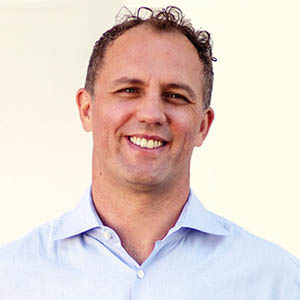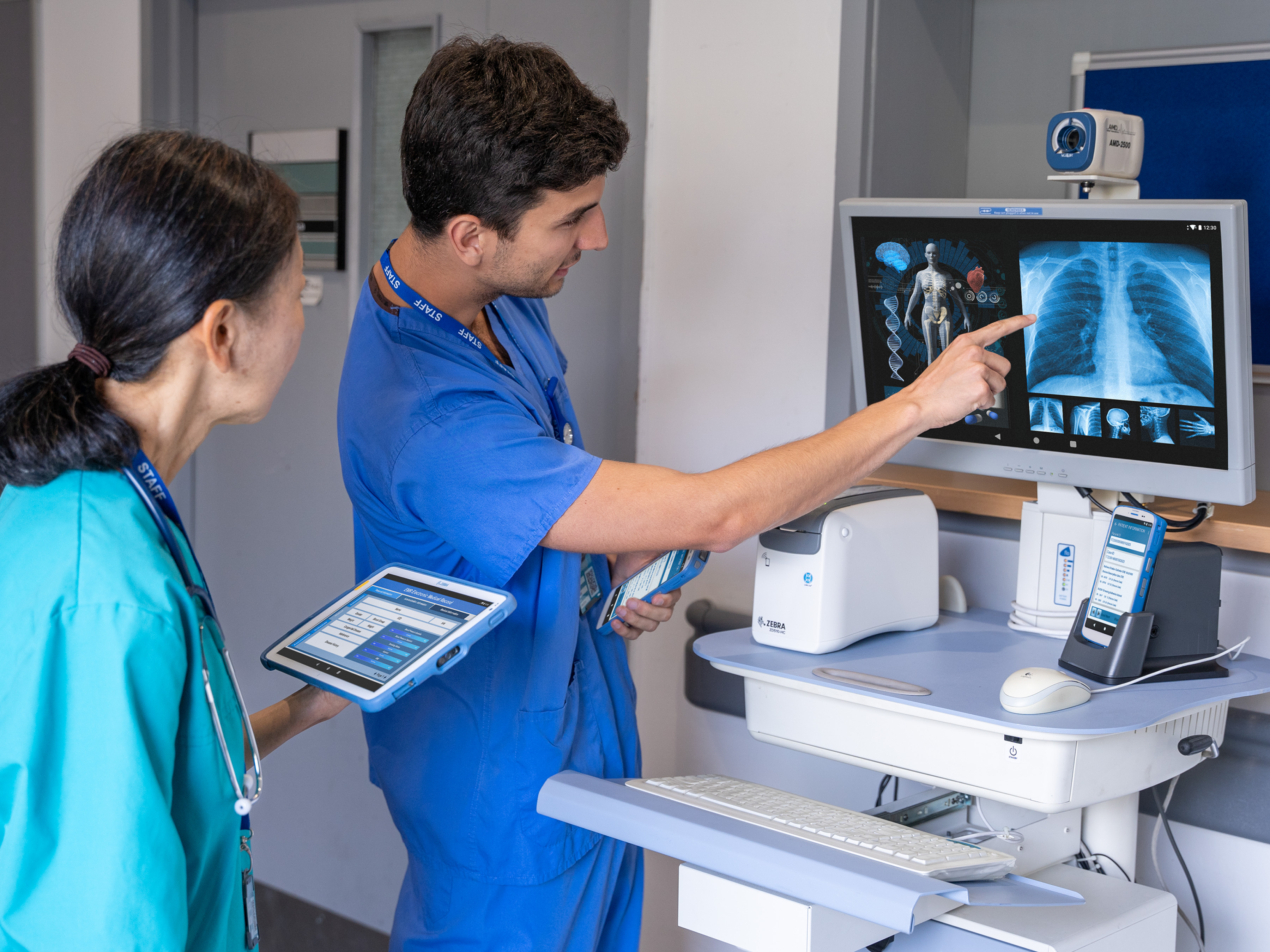Transform retail operations with Zebra’s retail technology solutions, featuring hardware and software for improving inventory management and empowering teams.
Streamline operations with Zebra’s healthcare technology solutions, featuring hardware and software to improve staff collaboration and optimise workflows.
Enhance processes with Zebra’s manufacturing technology solutions, featuring hardware and software for automation, data analysis, and factory connectivity.
Zebra’s transportation and logistics technology solutions feature hardware and software for enhancing route planning, visibility, and automating processes.
Zebra's hospitality technology solutions equip your hotel and restaurant staff to deliver superior customer and guest service through inventory tracking and more.
Zebra's market-leading solutions and products improve customer satisfaction with a lower cost per interaction by keeping service representatives connected with colleagues, customers, management and the tools they use to satisfy customers across the supply chain.
Empower your field workers with purpose-driven mobile technology solutions to help them capture and share critical data in any environment.
Zebra's range of mobile computers equip your workforce with the devices they need from handhelds and tablets to wearables and vehicle-mounted computers.
Zebra's desktop, mobile, industrial, and portable printers for barcode labels, receipts, RFID tags and cards give you smarter ways to track and manage assets.
Zebra's 1D and 2D corded and cordless barcode scanners anticipate any scanning challenge in a variety of environments, whether retail, healthcare, T&L or manufacturing.
Zebra's extensive range of RAIN RFID readers, antennas, and printers give you consistent and accurate tracking.
Choose Zebra's reliable barcode, RFID and card supplies carefully selected to ensure high performance, print quality, durability and readability.
Zebra's rugged tablets and 2-in-1 laptops are thin and lightweight, yet rugged to work wherever you do on familiar and easy-to-use Windows or Android OS.
With Zebra's family of fixed industrial scanners and machine vision technologies, you can tailor your solutions to your environment and applications.
Zebra’s line of kiosks can meet any self-service or digital signage need, from checking prices and stock on an in-aisle store kiosk to fully-featured kiosks that can be deployed on the wall, counter, desktop or floor in a retail store, hotel, airport check-in gate, physician’s office, local government office and more.
Discover Zebra’s range of accessories from chargers, communication cables to cases to help you customise your mobile device for optimal efficiency.
Zebra's environmental sensors monitor temperature-sensitive products, offering data insights on environmental conditions across industry applications.
Zebra's location technologies provide real-time tracking for your organisation to better manage and optimise your critical assets and create more efficient workflows.
Enhance frontline operations with Zebra’s AI software solutions, which optimize workflows, streamline processes, and simplify tasks for improved business outcomes.
Empower your frontline with Zebra Companion AI, offering instant, tailored insights and support to streamline operations and enhance productivity.
Boost productivity with Zebra Frontline AI Enablers: AI vision models, sample apps, and APIs streamline workflows for efficient business processes.
Zebra Frontline AI Blueprints deliver adaptable, real-world AI frameworks that automate manual tasks and drive efficiency in high-pressure frontline operations.
Zebra Workcloud, enterprise software solutions boost efficiency, cut costs, improve inventory management, simplify communication and optimize resources.
Keep labour costs low, your talent happy and your organisation compliant. Create an agile operation that can navigate unexpected schedule changes and customer demand to drive sales, satisfy customers and improve your bottom line.
Drive successful enterprise collaboration with prioritized task notifications and improved communication capabilities for easier team collaboration.
Get full visibility of your inventory and automatically pinpoint leaks across all channels.
Reduce uncertainty when you anticipate market volatility. Predict, plan and stay agile to align inventory with shifting demand.
Drive down costs while driving up employee, security, and network performance with software designed to enhance Zebra's wireless infrastructure and mobile solutions.
Explore Zebra’s printer software to integrate, manage and monitor printers easily, maximising IT resources and minimising down time.
Make the most of every stage of your scanning journey from deployment to optimisation. Zebra's barcode scanner software lets you keep devices current and adapt them to your business needs for a stronger ROI across the full lifecycle.
RFID development, demonstration and production software and utilities help you build and manage your RFID deployments more efficiently.
RFID development, demonstration and production software and utilities help you build and manage your RFID deployments more efficiently.
Zebra DNA is the industry’s broadest suite of enterprise software that delivers an ideal experience for all during the entire lifetime of every Zebra device.
Advance your digital transformation and execute your strategic plans with the help of the right location and tracking technology.
The Zebra Aurora suite of machine vision software enables users to solve their track-and-trace, vision inspection and industrial automation needs.
Zebra Aurora Focus brings a new level of simplicity to controlling enterprise-wide manufacturing and logistics automation solutions. With this powerful interface, it’s easy to set up, deploy and run Zebra’s Fixed Industrial Scanners and Machine Vision Smart Cameras, eliminating the need for different tools and reducing training and deployment time.
Aurora Imaging Library™, formerly Matrox Imaging Library, machine-vision software development kit (SDK) has a deep collection of tools for image capture, processing, analysis, annotation, display, and archiving. Code-level customisation starts here.
Aurora Design Assistant™, formerly Matrox Design Assistant, integrated development environment (IDE) is a flowchart-based platform for building machine vision applications, with templates to speed up development and bring solutions online quicker.
Designed for experienced programmers proficient in vision applications, Aurora Vision Library provides the same sophisticated functionality as our Aurora Vision Studio software but presented in programming language.
Aurora Vision Studio, an image processing software for machine & computer vision engineers, allows quick creation, integration & monitoring of powerful OEM vision applications.
Adding innovative tech is critical to your success, but it can be complex and disruptive. Professional Services help you accelerate adoption, and maximise productivity without affecting your workflows, business processes and finances.
Zebra's Managed Service delivers worry-free device management to ensure ultimate uptime for your Zebra Mobile Computers and Printers via dedicated experts.
Find ways you can contact Zebra Technologies’ Support, including Email and Chat, ask a technical question or initiate a Repair Request.
Zebra's Circular Economy Program helps you manage today’s challenges and plan for tomorrow with smart solutions that are good for your budget and the environment.

Industrial Automation Insider: The Unexpected, but Highly Effective, Uses of High-Tech and Low-Tech Automation Solutions in Healthcare
We know the pandemic changed care models. But it more significantly changed the economics of healthcare, which in turn changed the overall business model that is required to sustain a high quality of care in hospitals, clinics, pharmacies, and home health settings.
Doctors, nurses and other clinicians can’t do their jobs if they don’t have enough medical devices, medicines or beds available for patients. And many no longer want to stay in healthcare roles if they don’t have the resources they need to fully support patients – or receive the support they personally need to protect their own mental, physical and emotional health in these stressful times.
That’s why my guest on today’s episode of Industrial Automation Insider has been speaking with healthcare administrators, clinicians, and supply chain leaders around the world. He wants to understand what it’s going to take to unburden the delivery of care and ensure that medical supplies and pharmaceuticals are delivered to the right place at the right time so that we (at Zebra) can work with partners around the world to deliver effective solutions to those managing healthcare supply chains and clinical operations and providing patient care.
Chris Sullivan is the Global Strategy Practice Lead at Zebra and has worked tirelessly over the last several years – even before the pandemic – to understand what patients need and, subsequently, what healthcare community members need to help those patients. He also serves as a board member for numerous healthcare organizations. So, I thought it would be good to pick his brain about the macro trends occurring around the world and how they’ll likely impact healthcare’s future model. I was also curious whether we can expect to see major technology-fueled transformations occurring in healthcare in the next 12 months or more of a reversion to pre-pandemic priorities and practices. Though healthcare leaders have done a great job of embracing the EMRAM model to guide the digitalization of clinical models at a fundamental level, the utilization of more advanced technologies such as RFID, AI, machine vision and even robots at the edge of clinical operations seems to be inconsistent.
In our 30-minute conversation, Chris sets the record straight on:
How the sustained level of patient demand – and imbalance of supply and demand – has changed healthcare leaders’ attitude toward technology and, in particular, automation.
The high impact of low-tech solutions, like barcode-based technology.
What types of advanced technology investments are being deprioritized, accelerated or perhaps considered for the first time and why.
How technologies like machine vision are actually being used in healthcare supply chains and clinical environments. (Automated data capture in hospitals?!)
The operational and patient issues bubbling up in Zebra’s healthcare customer advisory board meetings with global hospital administrators, clinicians and IT leaders, along with the solutions they’re exploring.
Chris also highlights that many healthcare providers are getting burdened with excessive administrative needs, and this is impacting the time they have available to spend directly with patients. Industry leaders see many pitfalls with this approach and are working hard to address this issue. So, tune in now to find out what it will take for healthcare leaders to turn patients’ visions for modern care models into reality and why it will be imperative to define an edge environment roadmap this year.
LISTEN NOW

Will Corns
William Corns is the Senior North American Sales Manager for Fixed Industrial Scanning & Machine Vision at Zebra Technologies, leading a team of industrial automation experts and driving key conversations with customers about the value of industrial automation in today's challenging business environment. William joined Zebra in 2021 after selling his machine vision company that he founded in 2003. With nearly two decades of machine vision experience, William brings with him knowledge of complex vision systems, artificial intelligence, 3D scanning, robotics and integrated industrial automation workflows. Now he leads our team of Fixed Industrial Scanner & Machine Vision experts for Zebra.
Zebra Developer Blog
Zebra Developer BlogZebra Developer Blog
Are you a Zebra Developer? Find more technical discussions on our Developer Portal blog.
Zebra Story Hub
Zebra Story HubZebra Story Hub
Looking for more expert insights? Visit the Zebra Story Hub for more interviews, news, and industry trend analysis.
Search the Blog
Search the BlogSearch the Blog
Use the below link to search all of our blog posts.
Most Recent
Legal Terms of Use Privacy Policy Supply Chain Transparency
ZEBRA and the stylized Zebra head are trademarks of Zebra Technologies Corp., registered in many jurisdictions worldwide. All other trademarks are the property of their respective owners. Note: Some content or images on zebra.com may have been generated in whole or in part by AI. ©2026 Zebra Technologies Corp. and/or its affiliates.




![[Category, Subcat or Product] Representational Image 16:9](/content/dam/zebra_dam/global/zcom-web-production/web-production-photography/newsroom/2026-images/photography-web-newsroom-featured-03-16x9-en-us-013026.jpg.imgo.jpg)